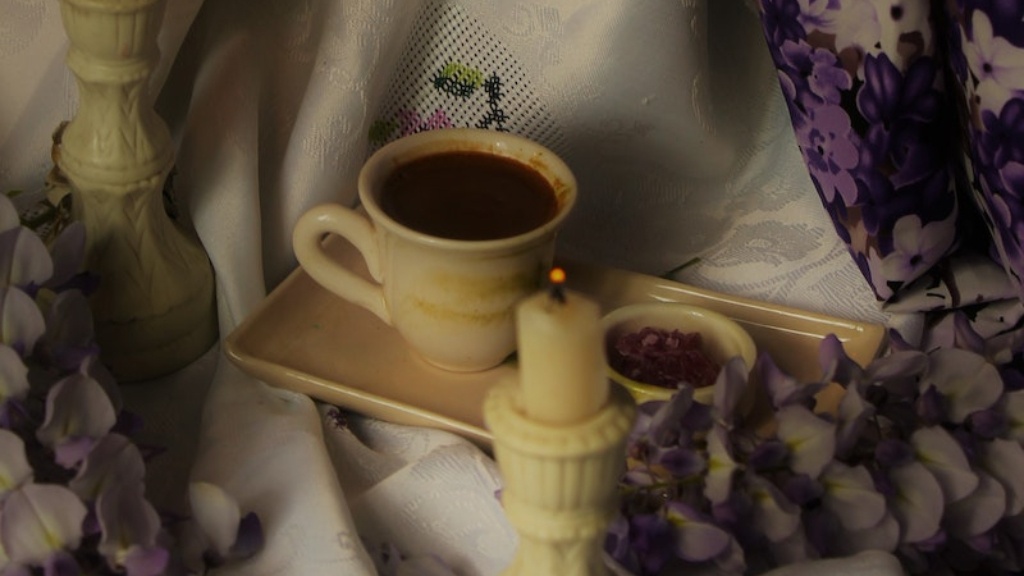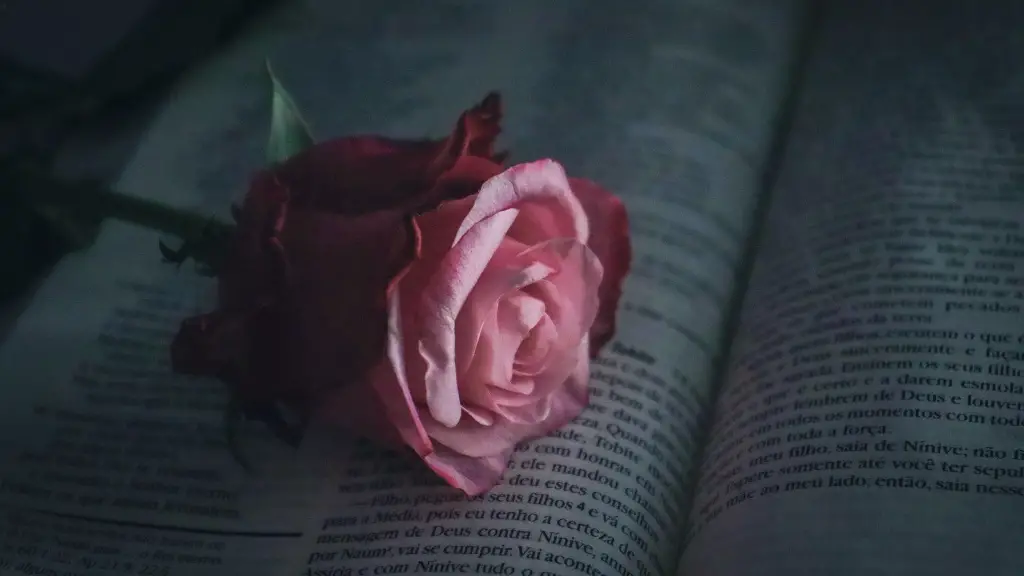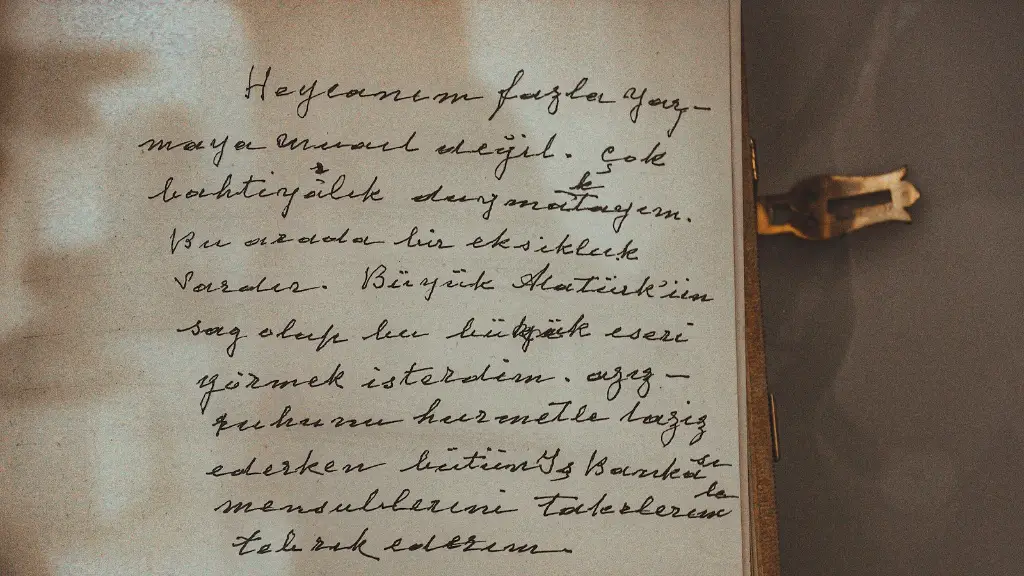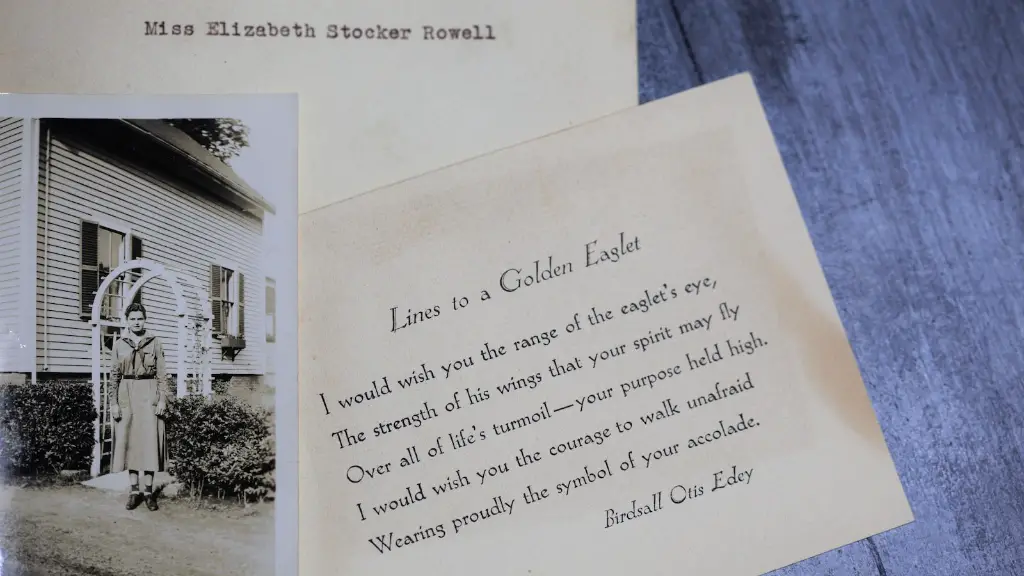A History of Poetry
Poetry is one of the oldest forms of human expression. From time immemorial, humans from all over the world have utilized poetic language to communicate their thoughts, insights, and emotions. The first known poem, The Epic of Gilgamesh, was written over 4,000 years ago in Mesopotamia, and since then, the written legacy of poetry has passed down from generation to generation and spanned countless cultures and eras. Through poetry, humans have been able to immortalize and immortalize grand stories, philosophies, love letters, and much more.
The form of poetry has also undergone a number of changes throughout history. Ancient Greek and Roman poems were written at a much slower pace and were often littered with extended metaphors and complex metaphors. During the Renaissance period, poets such as William Shakespeare experimented with rhyme and meter, resulting in some of the most beloved sonnets and poems of all time. By the 20th century, the form of poetry had become much more varied and open-ended, with modernist and postmodernist poets such as T.S. Eliot and Ezra Pound, who wrote in free-verse forms and often took inspiration from popular culture, science, and current events.
Today, poetry is as relevant as it ever was, with countless writers and spoken-word poets continuing to find new and innovative ways to express themselves. Poetry continues to be a powerful and ubiquitous force, a tool for people to explore their thoughts and feelings and share them with the world.
The Purpose of Poetry
Poetry can be written for a variety of reasons, from a cathartic escape for the poet to a performative avenue for the writer to connect with audiences. In some cases, poets may even write as a political or social statement, as was the case with powerful protest poems from such poets as Langston Hughes and Amiri Baraka. But no matter the purpose, all poetry serves one common purpose: to communicate. Through its intriguing cadences and meter, imagery, and structure, poetry has the ability to convey vibrantly the poet’s innermost thoughts and feelings.
It is also important to note that poetry is not just beautiful words put together to form an aesthetically pleasing whole. Rather, many poems have deeper meanings that are both philosophical and personal in nature, and these meanings can often be discerned through careful analysis of the text. This analysis could be as simple as exploring the poem’s metaphors and symbols, or as complicated as looking for patterns in the poem’s structure. By doing so, readers can gain insight not only into the poet but also into larger philosophical questions.
In this way, poetry is a tool for people to come to terms with their emotions, their past, and the human experience. As such, poetry has immense power and should always be respected, valued, and upheld as a unique form of communication.
Writing a Poem
For those interested in writing their own poems, the process often begins with brainstorming and writing down whatever comes to mind. Poets can use any words or sounds they like – free-verse poems allow for a wide range of expression that needs no form or meter. As the ideas begin to converge and fall into place, the poet can use various techniques such as alliteration, similes, and personification to give the poem structure and bring life to the words.
The next step is to look at the poem from a critical angle and revise it. It is important to be honest and ruthlessly cut down anything that does not contribute to the poem. For example, does the poem effectively convey the poet’s message or does it ramble on aimlessly? Is there a conversational arc to the poem that keeps the reader engaged? Does the poem explore its subject matter in an innovative and creative way?
These are all important questions that the poet must ask themselves while revising and editing their work. In the end, it is the poet’s responsibility to craft a piece that speaks to the reader and calls to the soul.
The Impact of Poetry
Poetry has been used to express and explore many different emotions and ideologies in human life. Whether it be lyrical love poems, somber elegies, or biting political satire, poetic language has the ability to move and inspire people. Poetry has also been effective in broadening conversations on topics such as racism, sexism, xenophobia, and more.
In the past, much of Western poetry was written for a primarily white audience and, as such, did not touch upon the experiences of marginalized groups. However, there has been a significant shift in recent years as more and more poets from diverse backgrounds have been given a platform to share their stories and perspectives. Through these powerful voices, readers have gained a deeper understanding of the struggles and realities faced by various communities, and have in turn been able to reflect on their own privileges and biases.
The power of poetry is also manifested in its ability to connect us to our memories, our emotions, and our collective history. It is a form of communication that allows us to explore the depths of our psyches and to improve our understanding of ourselves, our world, and each other.
The Power of Spoken-Word Poetry
Spoken-word poetry has enjoyed a massive surge in popularity in recent decades, thanks to the rise of YouTube and other social media platforms. This form of poetry is especially appealing to modern audiences as it often combines spoken-word verse with musical elements such as rhythm and intonation.
Spoken-word poetry has been used powerfully to open up important conversations about topics such as mental health and social justice. These performances often take on a confessional aspect, in which the poet poignantly shares the innermost details of their lives. In this way, spoken-word poetry has the capacity to move audiences on an emotional level, to challenge existing views and beliefs, and to create powerful connections across cultures and generational lines.
The Future of Poetry
As technology continues to permeate our lives and culture, it is likely that the tools of poetry and literature – specifically, the use of language to communicate thought and emotion – will remain a cornerstone of humanity. Rather than being viewed as an archaic art form, poetry and literature are likely to be seen as some of the most powerful and effective tools for navigating the challenges and opportunities of the future.
The internet has also opened up immense opportunities for poets to connect with global audiences and share their work. Through platforms such as social media, poets can quickly and easily find communities of like-minded individuals who provide invaluable support and feedback. In this way, the online world has helped poets gain a larger audience and make their voices heard in a much broader way than ever before.
In conclusion, despite its long history, poetry remains as vibrant and relevant as ever. Its ability to move audiences both emotionally and intellectually, to give readers insight into the self and their peers, and to challenge existing conceptions of the world is unparalleled. One can expect that this art form will only grow in relevance and popularity in the future, inspiring readers and writers for generations to come.
Poetry and Music
Over the years, there has been a strong relationship between music and poetry. Since the prehistoric days of oral storytellers, music has been used to express emotions, tell stories, and share thoughts and experiences with others. For instance, the Blues, a genre that originated in the southern United States in the mid-19th century, often blended together poetic lyrics with the rhythm of the instrumentation to deliver a song of sorrow and oppression. Similarly, Christian hymns, spirituals, and gospel often used poetic language to express religious faith and beliefs.
In more contemporary forms of music, poetry is often used to communicate the same type of messages. Hip hop and rap have become immensely popular throughout the world and they both use aesthetic rhythmic flows and intricate rhyme schemes to create enchanting stories. Similarly, a number of popular pop songs have utilized poetic language to deliver emotionally impactful messages.
As such, it is safe to say that poetry and music will continue to go hand in hand for years to come. With its poetic language, music can reach depths and heights that no other form of communication can. Through power of their words, talented poets can capture their feelings and reach their audiences in deep and meaningful ways.
The Poetic Voice
In the world of poetry, one of the most essential elements is the poet’s voice. Poets not only have the ability to write words down on paper, they also have the ability to express their emotions through the power of their words. Every poet has a distinct voice that can make their poems stand out, and it is this voice that gives the poem its life and energy.
It is important for aspiring poets to find their own voice and make it their own. Every poet should take the time to explore and reflect on their experiences and thoughts, and to find what makes them unique. By doing so, poets can create poetry that speaks truly from the heart and resonates with the soul of their readers.
Once the poet has found their voice, they should strive to always remain true to it, even if it strays from popular trends and ideas. A strong, confident voice often takes years to cultivate, and is something that all poets should strive for in their works.
The Power of Poetry
In the end, poetry is a powerful and ubiquitous tool with the capacity to evoke strong emotions, challenge existing beliefs and social norms, and create meaningful connections with readers. It is a highly personal form of communication that requires both craftsmanship and vulnerability – a power that should not be taken lightly.
As such, it is important to remember the immense capabilities of poetic language, appreciate the craftsmanship of poets, and recognize the impact of the poetic voice. The world of poetry is vast and open to all levels of exploration, and it is with this exploration that poets can find the power to share their stories, thoughts, and emotions, and be heard around the world.
Teaching Poetry
Teaching poetry can be a delicate and tricky process, as it requires the teacher to find a balance between imparting knowledge and allowing the students to find their own voice. The primary goal of a poetry teacher should be to show students the beauty and power of poetic language and to help them to build a strong connection to the material.
One way to do this is to first encourage students to write down whatever thoughts and ideas they have, without worrying too much about grammar, punctuation, or structure. This allows students to tap into the creative side of their brains and express whatever feelings they have in whatever way they can.
It is also important for the teacher to give constructive feedback and discussions, so as to guide and help the students improve their work. When looking at revisions and edits, the teacher should also give the students freedom to explore and find their own voice and style. This will help the student develop a lasting affinity to poetry and foster an environment of personal growth and discovery.
Conclusion
In the end, poetry is a unique and powerful form of communication that has been relied on for centuries to express thoughts, emotions, and pictures of the world. While the form has changed dramatically over the years, it has retained its essence and ability to bring people together. Through its complex and intriguing language, poetry has a unique power to move and inspire people, to reflect on their own experiences, and to gain insight into larger philosophical questions. Poetry is a craft that requires both skill and vulnerability, and its power should not be taken lightly.





